The talks in Vienna offer the first faint hope for a solution to the civil war that has wracked Syria. But intractable issues could yet frustrate this hopeful beginning.
At first blush, the auspicious beginning of the latest peace initiative on Syria that concluded in Vienna on October 30 offers much by which to be encouraged.
The 17 participating nations, plus the European Union and the United Nations—the Syrian government did not participate—issued a joint communiqué that called for, inter alia: protection of the rights of all Syrian people; the defeat of the Islamic State (IS); and an invitation to the United Nations (UN) to convene representatives of Syria’s government and the Syrian opposition in order to seek a political process leading to credible, inclusive, non-sectarian governance, followed by a UN-supervised process to establish a new constitution and hold free elections. Moreover, the parties committed to maintain Syria’s territorial integrity and state institutions.
A number of factors make this newest peace-brokering initiative different from the two Geneva collectives that preceded it.
First, Iran was present, a derivative of the Iran-P5+1 nuclear accord that served to bring the Islamic Republic closer to the doorstep of acceptability in the international community. Iran has much invested in Syria, bankrolling Syrian President Bashar al-Assad to the tune of billions annually and deploying hundreds of Islamic Revolutionary Guard Corps troops there to protect his regime and lead the fight against opposition forces, including the Islamic State, but also many moderate opponents.
Second, the scale of the Syrian tragedy has become too big for anyone to ignore. Casualties now exceed 250,000 by some estimates. One-half of the Syrian population of 23 million has been forced from their homes—4.5 million as refugees and the rest as IDPs, or internally displaced persons. Many of the former are besieging Europe’s borders, creating something of a crisis for European states still struggling to address high unemployment and lackluster economic growth since the 2008 global economic crisis.
Third, there is a new player on the ground in Syria, Russia, which weeks ago deployed two dozen war planes to the country’s western coast, ostensibly to help carry the fight to IS, but more apparently to shore up Assad’s flagging forces in the western part of the country. Russia has created new “facts on the ground” in Syria, complicating matters for the US and Arab Gulf states.
Finally, efforts to halt the forces of IS, including those of the US-led 40-nation coalition, have done little to staunch the terrorist group’s advances in Syria and Iraq. The reality of the need for a global effort to defeat and eliminate the region’s most diabolically ruthless and efficient terrorist group now appears obvious to all.
Issuing pleasant sounding and even sensible joint communiqués, however, may be the easiest part; although media reporting suggest that even the discussions leading to it became heated. But if these governments can reach such a lofty goal statement, and even win the endorsement of Syria’s government, what’s preventing them from ending this tragedy?
The answer is actually pretty simple: The conflicting parochial interests of the countries participating, especially Iran, Russia, Saudi Arabia (and its Gulf partners) and the US.
Interests at Play
Iran seeks to preserve quasi-Shia Alawite rule in Sunni-majority Syria and protect its Lebanese Shia client, Hezbollah. Any solution that effectively isolates Hezbollah from its indispensable Iranian benefactor would be a non-starter in Tehran. Iran would prefer to see Assad remain, however, it might be prepared to tolerate his exit after an interim period, but only if the Hezbollah nexus is not threatened—in other words, some semblance of the current regime would have to remain.
Russia wants to keep its bases, particularly the naval facility near Latakia, and undermine America’s traditional dominant influence in the Middle East. The latter is associated with Russian President Vladimir Putin’s effort to move Russia back onto the global stage of international politics. Furthermore, Russia views almost any effort to bring popular rule to the region as nothing more than a veiled American pursuit of instability and consequent regional dominance. Therefore, keeping Assad in place until a suitable Russia-sympathetic replacement can be found is essential.
Saudi Arabia and its Gulf partners want to remove the Alawite grip on Syria, replace it with a Sunni government and reduce, if not eliminate Iran’s presence and influence. The Saudis fear that Iran is on a hegemonic quest in the Middle East with outsized actions in Iraq, Yemen, Lebanon and Syria. Halting the Iranians in Syria would go a long way to curbing the Islamic Republic’s perceived ambitions. The removal of President Assad is a sine qua non for Saudi Arabia.
America’s interests are less obvious but no less important. Bringing democracy to Syria—and, equally vital, eradicating Islamic State-like extremism in the country—would bring much needed stability to the region, reduce pressure on neighboring countries like Lebanon and Iraq that are also struggling with nascent democracies, and preserve Israel’s security. Obviously, leaving Assad in charge would frustrate any genuine democratic process. However, Washington has moved off its prior “Assad must go” perch and would probably be able to tolerate his remaining if only briefly.
The Gordian knot in all of this is the future of President Assad. While the positions of the parties to the Vienna talks are known, Syrians have yet to be able to voice their wishes. The 2014 elections, in which he incredulously won over 90% of the vote, have been virtually discredited. After all that has transpired in this near-five year conflict, however, it is hard to believe that anything more than a fraction of Syrian voters would accept his continuing as president in any kind of new government—democratic or otherwise. Therefore, his exit regardless of how it happens is inevitable; only its timing remains to be negotiated.
Even so, the aforementioned conflicting interests of these major parties—most of which directly conflict—create substantial obstacles to a resolution, even if they may genuinely accept the pledges of the joint communiqué. Moreover, communiqué pledges must also translate to actions on the ground, many involving millions of people and violent extremist groups.
Nevertheless, the imperative of staunching the national hemorrhage that is Syria and returning peace and stability to the country’s suffering population must prevail. And it must do so quickly in view of the mounting toll of victims and destruction of their nation.
The views expressed in this article are the author’s own and do not necessarily reflect Fair Observer’s editorial policy.
Photo Credit: Volodymyr Borodin / Shutterstock.com
 We bring you perspectives from around the world. Help us to inform and educate. Your donation is tax-deductible. Join over 400 people to become a donor or you could choose to be a sponsor.
We bring you perspectives from around the world. Help us to inform and educate. Your donation is tax-deductible. Join over 400 people to become a donor or you could choose to be a sponsor.
Support Fair Observer
We rely on your support for our independence, diversity and quality.
For more than 10 years, Fair Observer has been free, fair and independent. No billionaire owns us, no advertisers control us. We are a reader-supported nonprofit. Unlike many other publications, we keep our content free for readers regardless of where they live or whether they can afford to pay. We have no paywalls and no ads.
In the post-truth era of fake news, echo chambers and filter bubbles, we publish a plurality of perspectives from around the world. Anyone can publish with us, but everyone goes through a rigorous editorial process. So, you get fact-checked, well-reasoned content instead of noise.
We publish 2,500+ voices from 90+ countries. We also conduct education and training programs
on subjects ranging from digital media and journalism to writing and critical thinking. This
doesn’t come cheap. Servers, editors, trainers and web developers cost
money.
Please consider supporting us on a regular basis as a recurring donor or a
sustaining member.
Will you support FO’s journalism?
We rely on your support for our independence, diversity and quality.




